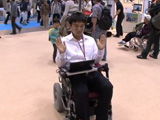|
|
TODAY.AZ / Weird / Interesting
Face-controlled wheelchair moves with the clench of a jaw - VIDEO
18 October 2011 [13:16] - TODAY.AZ
 For those paralyzed from the neck down, controlling a wheelchair even with a joystick is impossible. Researchers at Japan's Miyazaki University have created a wheelchair that solves that problem with electrodes affixed to the face. Certain motions will cause the wheelchair to move, stop, and turn--and it can all be done above the neck.
For those paralyzed from the neck down, controlling a wheelchair even with a joystick is impossible. Researchers at Japan's Miyazaki University have created a wheelchair that solves that problem with electrodes affixed to the face. Certain motions will cause the wheelchair to move, stop, and turn--and it can all be done above the neck.We've seen a lot of advanced wheelchairs and wheelchair accessories, from a Kinect-enabled cart to smarter voice-controlled chairs to solar-powered long-distance vehicles, but the ability to grant independent movement to someone with below-the-neck paralysis (the sometime result of ALS or muscular dystrophy) is new and pretty amazing.
An array of electrodes are attached to the face, and a few distinct motions control it. Clenching the jaw starts it moving forward, and a hard wink on either eye--hard enough to tense the cheek muscle, which triggers the electrode--indicates a turn. A second clenched jaw stops the chair.
The researchers experimented with allowing different speeds, but found that it was more effective to include a proximity sensor instead. The sensor detects if there are objects in the chair's path. A clear path ahead will increase the speed, while obstacles will decrease the speed until the chair finally stops a few feet from the obstacle.
In the future, the researchers plan to ditch the somewhat unsightly electrodes in favor of a system embedded in goggles, which will be wirelessly synced with the chair. Hopefully that's possible--the electrodes actually look pretty effective, and this chair could be a life-changing invention for those currently without independent movement.
/Popular Science/
Watch video:
URL: http://www.today.az/news/interesting/96610.html
 Print version
Print version
Views: 1498
Connect with us. Get latest news and updates.
See Also
- 06 December 2024 [22:20]
Are scented candles harmful to health? - 23 November 2024 [14:11]
Magnitude 4.5 earthquake hits Azerbaijan's Lachin - 20 November 2024 [23:30]
Launch vehicle with prototype of Starship made its sixth test flight - 27 October 2024 [09:00]
Fuel prices expected to rise in Sweden - 24 October 2024 [19:14]
Turkiye strikes terror targets in Iraq and Syria - 23 October 2024 [23:46]
Kazakhstan supplied almost entire volume of oil planned for 2024 to Germany in 9 months - 23 October 2024 [22:17]
Taiwan reported passage of Chinese Navy aircraft carrier near island - 23 October 2024 [21:50]
Russia remains largest oil supplier to India - 16 October 2024 [17:54]
Gamesummit co-founder shares insights on future of gaming industry in Azerbaijan [EXCLUSIVE] - 12 October 2024 [18:27]
TikTok cuts jobs, turns to AI for content moderation
Most Popular
 UNESCO celebrates 950th anniversary of Diwan Lughat al-Turk
UNESCO celebrates 950th anniversary of Diwan Lughat al-Turk
 More Armenians fly: the crisis of power in Canada
More Armenians fly: the crisis of power in Canada
 Azerbaijani delegation participates in internet governance forum in Riyadh
Azerbaijani delegation participates in internet governance forum in Riyadh
 Rubik Vardanyan surprises his own lawyers
Rubik Vardanyan surprises his own lawyers
 Armenian militant group threatens regional stability aligning with PKK/YPG in new ground
Armenian militant group threatens regional stability aligning with PKK/YPG in new ground
 Azerbaijan's role in COP29 highlights growing global influence, says MEDIA Director
Azerbaijan's role in COP29 highlights growing global influence, says MEDIA Director
 Lapshin shows up, again collecting alms from naive Armenians
Lapshin shows up, again collecting alms from naive Armenians
